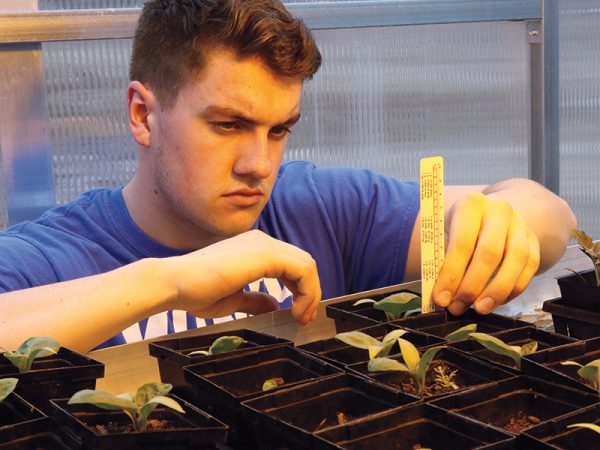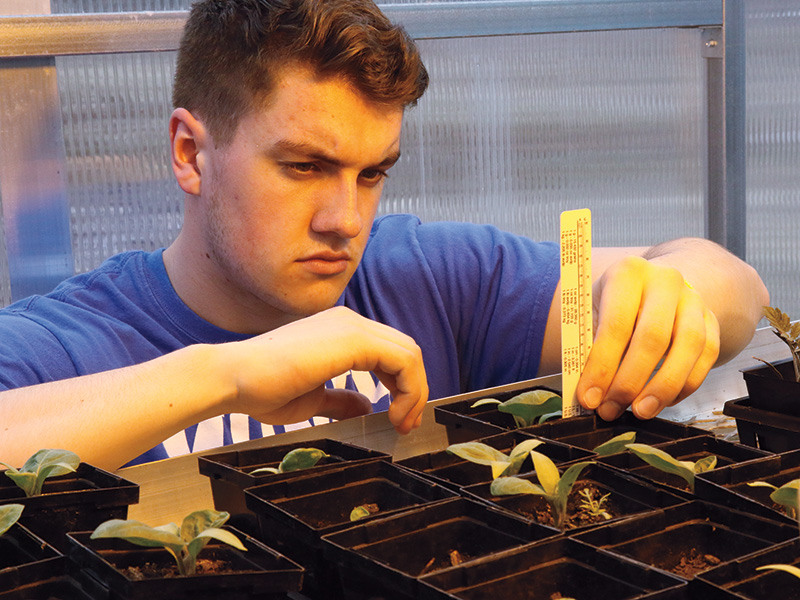When community members gathered at the Stone Barn for this year’s annual seedling sale, they purchased vegetable, herb, and flower seedlings that were cultivated by Saint Joseph’s College students. Tyler Barrows ’20 of York, Maine, is among the dozens of students who have walked across the street to one of the hoop houses at the College’s farm throughout the semester. As one of the students enrolled in Environmental Science 300: Ecology and the Environmental Challenge, Tyler is conducting his assigned research project on growth rates of vegetable seedlings.

Each of the approximately 1,000 students on campus must enroll in ES300 which is a Core course that teaches basic ecological principles, the major environmental challenges facing the planet, and potential solutions to these challenges. ES300 students learn about the adverse effects of the large-scale, industrial form of agriculture that dominates modern food production.
As a nursing major, Tyler didn’t know how he would benefit from taking the ES300 course. He said, “When I was going into ES300, I thought, ‘why do I have to take this? It’s a Core class, but how am I going to use it?’ But now I have a newfound interest. I’m considering minoring in environmental studies. This subject gets me to think differently. It’s the same with my Human Nature & Ethics class; it makes me a more well rounded person.”
This year’s seedling sale represents the mission of the Institute for Local Food Systems Innovation by creating experiential learning opportunities for our students.
As Tyler picked up his clipboard and ruler, he explained the research project. He said, “Professor Teegarden is introducing us to how to design an experiment, how to conduct research, and how to set up control and dependent groups. This is a growing lamp hat mimics solar UV light and heat.” Tyler pointed to the dome-shaped shade directing light down toward a table covered with potted seedlings. “Our process is to come over each week and pick—randomly—ten plants from the dependent group and another ten from the control group. We measure the height of the plant from the bottom of the stem to the top of the highest leaf. At the end of the semester, we plot all of the data and interpret the results.”

Although Tyler is committed to nursing and already works as a licensed nursing assistant at Wentworth Douglass Hospital, this learning experience has transformed how he sees the world around him. “Growing up by the ocean, I lived near multiple ecosystems. Once I came to college, I realized how lucky I was to have had this rare exposure. At Saint Joseph’s, I have the opportunity to learn and then make a difference in my hometown. Something as simple as trash collection on the beach can make a big impact. The town of York’s population triples in the summer and the beaches can accumulate trash. Now, I see this. I’m really concerned with it. I’m interested in sustainability in my own town. Dr. Teegarden’s class has made me realize these things.”
Hands-on student involvement in the hoop house has not been limited to getting their hands dirty with the seedlings. Elyse Caiazzo, graduating senior and assistant program director for the Institute for Local Food Systems Innovation, worked with ES300 faculty to integrate the Saint Joseph’s students into the agricultural experience. “This year’s seedling sale represents the mission of the Institute for Local Food Systems Innovation by creating experiential learning opportunities for our students, connecting with our community with sustainability and wellness, and giving the students a chance to be entrepreneurial and build our own business,” said Caiazzo. In addition, fellow student Hayley Winslow ’18, Business Service Manager for ILFSI and other College enterprises developed the business plan for the seasonal enterprise.
